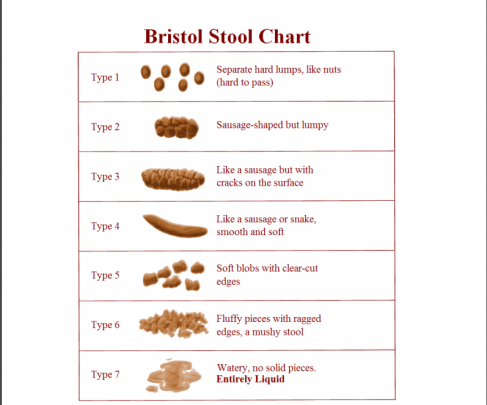What does your poo say about you?

No one wants to talk about poo. However, as it’s one of the easiest and most accurate ways to understand colon health, sometimes we have to talk about it.
Number two’s are the direct reflection of your diet and lifestyle so knowing the different kinds of poo and what they mean can help you improve your overall quality of health.
The Bristol Stool Chart was created as a way of defining the types of stools that people produce. According to the chart there are seven different types of poo that categorise whether you are having an ideal or an unusual bowel movement.

The progression of the stool chart shows that types 1 and 2 are signs of constipation, types 3, 4 and 5 are healthy stools and types 6 and 7 indicate diarrhoea. The development of your stool is dependent on anything that is ingested throughout the day as well as outside factors such as heightened levels of stress.
Unsurprisingly, it’s better for your bowels to produce types 6 or 7 rather than types 1 or 2.
If a stool is hard to pass then it can result in lacerations, haemorrhoids or anal prolapse that will not only cause immense pain but also increase the risk of an infection.
A watery poo, such as type 7, can be linked to gut diseases or food poisoning and therefore often merits a visit to the doctors. As a general rule, soft and smooth stools are what you should aim for.
Ideally, people should be passing stool types 3 or 4 regularly. A healthy bowel means that there is no urgency to reach the toilet however the bowel movement should happen within a minute of reaching the ‘throne’.
While some people think they should be going after every meal, the regularity of toilet trips depends on the individual.
Some people will have a bowel movement up to three times a day but others will go as little as three times a week. How often you go shouldn’t be an indicator of how healthy you are, rather you should be focussing on the look and ease of exit to give yourself a better understanding.
Use this chart to make sure your stools are healthy and considered regular. If you are suffering from anything that seems worrying, make sure to consult your doctor.








 Proudly Australian owned and operated
Proudly Australian owned and operated